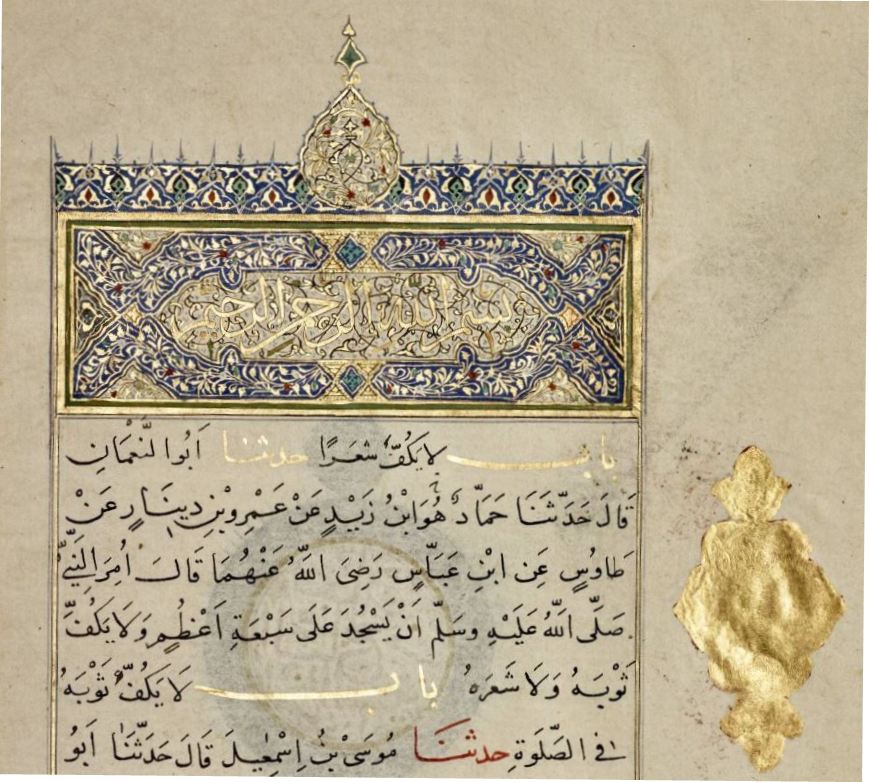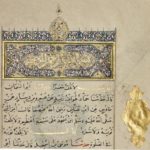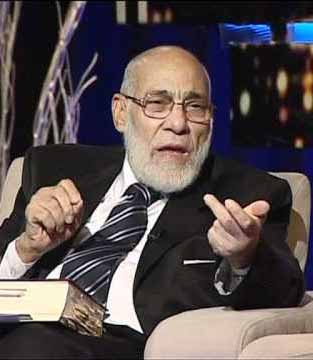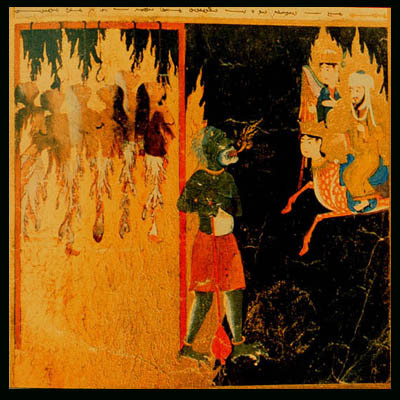
While the ‘ulamā’ have placed the condition of ‘non conflict of the content (of the Text) with reason, that is, the necessity of what is handed down to be in accordance with what is reasonable, and that the Text should be rationally acceptable and not demonstrating any weakness in the meaning (even if there is no associated weakness of expression), despite the importance of this condition Muslims have cancelled it out by limiting the evaluation of its agreement with reason as something to be carried out solely by the hadith collector.
AS A RESULT the question becomes closed when the hadith are included in one of the books of Sihāh, Masānīd or Sunan, or others. Reasonableness is thus considered to have been established for these included hadith, so that no one else is henceforth able to apply his own reason to the matter and must content himself with justifying it and rationalizing it. If not, he would be considered by others to be a rejecter of the hadith and to have left the faith.[1]
2) Cases of conflict with reason, logic, and common sense
Hadith whose validity has been confirmed in al-Bukhārī’s Sahīh (considered to be the best work in the field) but which are nevertheless incompatible with reason and clash with logic, are legion. We shall cite three:
If a fly falls into one of your pots, dip it in fully and then extract it, since one of its wings bears disease while the other bears the antidote.[2]
This hadith obviously runs against reason and offends against good taste, and if it were judged according to these standards it would clearly be held to have exceeded them, or at the very least considered to accord solely to the conditions of its era.
[On where the sun goes]: The Prophet said: “It passes until it prostrates itself beneath the Throne, and seeks and is granted permission. Soon it will prostrate but this will be rejected, and it will seek but not be granted permission. It will be told to ‘return whence you came’. Then it will rise from its setting place [the West]. These are the words of the Almighty: And the Sun runs on to its place of settlement. That is the determination of the Mighty, the Knowing One. [Qur’ān, XXXVI,38][3]
As a result of mankind’s knowledge, the human faculty of reason and basic scientific fact, it is now known that the sun does not ‘pass towards the West’, but rather the earth passes from West to East around the sun, and that the sun does not ‘prostrate itself’ but shines on in other places before it arrives at the Middle East. The upshot of all this is that to yield to the ‘correctness’ of the hadith means rejecting all scientific knowledge and rational conceptions, something which Islam does not call for and rather commands against. The above hadith is nevertheless viewed as an explanation that is scientific and inimitable and, following the example of Dr. Zaghloul el-Naggar,[4] something that is to be accepted.
God has written upon the son of Adam his lot from fornication, he will inevitably suffer it.
According to the requirements of reason, the standards of Islam and the scales of the Qur’ān, any evaluation of this hadith has to place it under suspicion, since it rejects the Qur’ānic principle of individual freedom as in the following verses:
Oh, but man is a telling witness against himself [Qur’ān LXXV,14]
Whatever of ill befalleth thee it is from thyself [Qur’ān, IV,79]
If an evil thing befall them as the consequence of their own deeds, lo! they are in despair! [Qur’ān, XXX,36]
One might add to this the fact that the hadith nullifies the principle of questioning and does not allow it to be a sin committed by the free will of the individual. For as long as his lot from fornication has been decreed him, how is it that he can he escape from his fate? Can any man? Why is he being punished for a fate he did not choose for himself, and did not even commit out of a conscious act of free will!
To yield to the ‘correctness’ of the Hadith means rejecting all scientific knowledge and rational conceptions
2) Cases of clear conflict with ethical values and principles
Hadith that denigrate women:
From Abū Hurayra comes this hadith:
The Messenger of God said: the performance of prayer is annulled by the [the passing before him of] a woman, an ass or a dog, but something like the back of a saddle guards against that.
This hadith conflicts with another hadith. Al-Bukhārī [751/1] and Muslim [221/4] cite the following:
I approached riding on a donkey while I was nearing the age of puberty, and the Prophet was praying in company at Mina where there were no walls. I passed between the lines of some of them, dismounted, left my donkey to graze and joined the line. No one objected to this.[5]
The depiction of the Prophet as lascivious:
The Messenger of God espied a woman, and his wife Zaynab came while she was tanning one of her hide skins, so he satisfied his urges with her and then departed to his companions, saying: a woman approaches looking like Satan and behaving like Satan, so if one of you should notice a woman, let him return to his family, since this will counteract what is in his mind.
A hadith that depicts him as bloodthirsty:
The Prophet loved to shed blood without evidence or witnesses. When one of the Companions informed him that a man had entered into the presence of his wife Mariah, he ordered ‘Alī ibn Abī Tālib to go and cut his head off, without seeking for evidence or proof. Had not the man’s private parts been exposed and he was found to be a eunuch, he would have been killed even if he had not committed any outrage or crime. Is this an example of the justice of the Messenger of God?[6]
Mysogynist hadith:
I ascended unto Heaven and saw that most of its inhabitants were the poor; I descended to Hell and saw that most of its inhabitants were women.[7]
Racist hadith:
I approached to the Prophet accompanied by a Berber valet. He asked me: “What is this boy’s race?” and I replied: “Berber, O Messenger of God.” He replied: Dear fellow, sell him, even for a single dinar”. To which I replied: “Why, O Messenger of God?” To which he answered: “They are a people to whom God sent a Messenger, but who slew him, cooked him and ate his flesh. They then sent the broth to the women who were not disturbed by this act. God Almighty said: I neither selected a Prophet from among you nor sent down to you a Messenger.
In another hadith there is the following:
There are none, under the sky or over the earth, more evil than the Berber. I would rather give alms chained to a whip in God’s path than set free a Berber’s neck.
While another runs:
The Messenger of God said: Berber women are better than their men. The Prophet sent an emissary to them and they killed him, while the women took charge of his burial. There are ten penalites; nine of them for the Berbers, and one for all others.
And:
The faith of the Berber never extends beyond their collarbones.
It is strange that some of us should approve these works like empty trumpets and repeat everything we hear uncritically and without review, even when they disfigure ourselves, our Nation and our Prophet. Take, for example, the hadith where it is said that the Prophet patted the rump of the donkey, and when the donkey wept at this, he asked: “Why are you crying?” And the donkey replied: “My father told me that an ancestor spoke of a great donkey who rode with Noah into the Ark, and that Noah had patted his rump saying: “From thy issue will come a donkey ridden by the Seal of the Prophets. Praise be to God that He made me to be that donkey!”[8]
The contradiction is therefore clear, not only between the hadith and the Qur’ān, but also between one hadith and another, and the above examples are just a sample of this. So why is priority invariably given to a radical and extremist ruling as opposed to a moderate and lenient ruling? This is a question that requires a separate, independent analytical study.
If rulings in the Qur’ān were fixed they would have been revealed at the outset
Contradiction as a solution – the Prophet’s personal reasoning
It has been left to secularists, liberals, atheists and agnostics to seek out, on behalf of groups that have pensioned off their own intellect, solutions and ways out that preserve for them the essence of their religion and turn it into a flexible religion capable of life, after the death that has been inflicted upon it for ages. There is always a solution and a way out from this type of religious problem – although this cannot be achieved by refusing or denying that there are such contradictions but rather through confirming that they exist. For one thing, they are so clear and numerous that any thinking person will be unable to dismiss them.
Secondly, we should say that hadith which contradict other hadith, or contradict the Qur’ān and conflict with its rulings and principles, are hadith that are deemed ‘sound’ as to their chains of transmission and their content. But in the end they are the result of the Prophet’s own personal reasoning in specific circumstances of place and time, when he found himself confronted with particular situations or problems that required him to step forth and find solutions that oppose or counteract the Qur’ānic ruling, or that contradict a previous ruling he himself made. This is therefore the approach which one should follow: a continuing search for solutions to contemporary problems. In this way the question of having to stick closely to a religious text is eliminated.

Suggested Reading
The first person to surpass this obligation was the Messenger himself, and indeed the obligation in itself is no more than an illusion and a great deception since it does not actually exist. In fact, this question of obligation – if we may term it so – was first overruled not by the Messenger but the Qur’ān itself with respect to another illusory issue: the issue of the abrogating and abrogated verses. This is another question which requires a fuller treatment, but let me say, briefly, that the question of the abrogating verse in the Qur’ān was not one that amounted to a rejection or exclusion of a preceding ruling, but one of locating a ruling that was superior to an earlier one and more appropriate to new circumstances – without it being to the exclusion of the earlier ruling.
Such of our revelation as We abrogate or cause to be forgotten, but we bring (in place) one better or the like thereof. Knowest thou not that Allah is Able to do all things? [Qur’ān II,106]
If rulings in the Qur’ān were fixed and obligatory, they would have been revealed directly and right at the outset. But what counts in this issue of the abrogating verse – the exchanging of one ruling for another – is the elaboration of a method for solving contemporary problems. Returning to the Text should be a process of adhering to a comprehensive approach, not a fragmentary process of following the Text. Nor should it be one of returning to the rulings in themselves but rather one of returning to the principles and an approach that shaped these rulings.
The very paucity of Qur’ānic rulings and legislations is yet another reason for avoiding prioritising them and is evidence for the fact that existent rulings are merely patterns and examples to take into consideration when deriving rulings using this method. They do not make the case for sticking to what is present in the Text.
[1] M.S al-‘Ashmāwī, The Truth concerning the Hijāb and the use of the Hadith as a Pretext.
[2] Narrated by Abū Hurayra and also preserved by Ibn Maja: On Medicine.
[3] Narrated by Abū Dharr and preserved by Muslim, Abū Dā’ūd, al-Tirmidhī and al-Nisā’ī.
[4] Dr El-Naggar is an Egyptian geologist and Muslim scholar who left his academic career to become the Chairman of the ‘Committee of Scientific Notions in the Qur’ān’ in the Egyptian Supreme Council of Islamic Affairs. Dr. Naggar’s philosophy of science is blended with religion and he writes mainly on the theme of the Iʽjāz al-Qur’ān, the ‘inimitable miracle of the Qur’ān, including the scientific truths it contains. His claim that NASA had confirmed the Splitting of the moon, a miracle attributed to the Prophet Muhammad and derived from Qur’ān LIV,1-2, was subsequently debunked by NASA as baseless. (Ed.)
[5] Isnad: حدثنا عبد الله بن يوسف، قال: أخبرنا مالك، عن ابن شهاب، عن عبيد الله بن عبد الله بن عتبة، عن عبد الله بن عباس
[6] From an article by Islam Buhayri: كتب التراث ليست مقدسة .. وبعضها يسئ للرسول .
[7] رواه البخاري 3241 ومسلم 2737
[8] Hamīd Dost, الأحاديث النبوية وأسئلة لا بد منها (‘Prophetic Hadith and Some Unavoidable Questions’) al-Hiwār al-Mutamaddin.
Main picture: The ḥadīth as scripture: a muṣḥaf-like page from the Ṣaḥīḥ al-Bukhārī with gold illumination. The passages calligraphically inscribed are Ḥadīths 815 and 816 from chapter كتاب الأذان : “The Prophet was ordered to prostrate on seven bony parts and not to tuck up his clothes or hair” (when performing ṣalāh). Unknown artist, Shiraz, dated 1400-1450. From the Keir Collection of Islamic Art, Object number K.1.2014.800.1.



